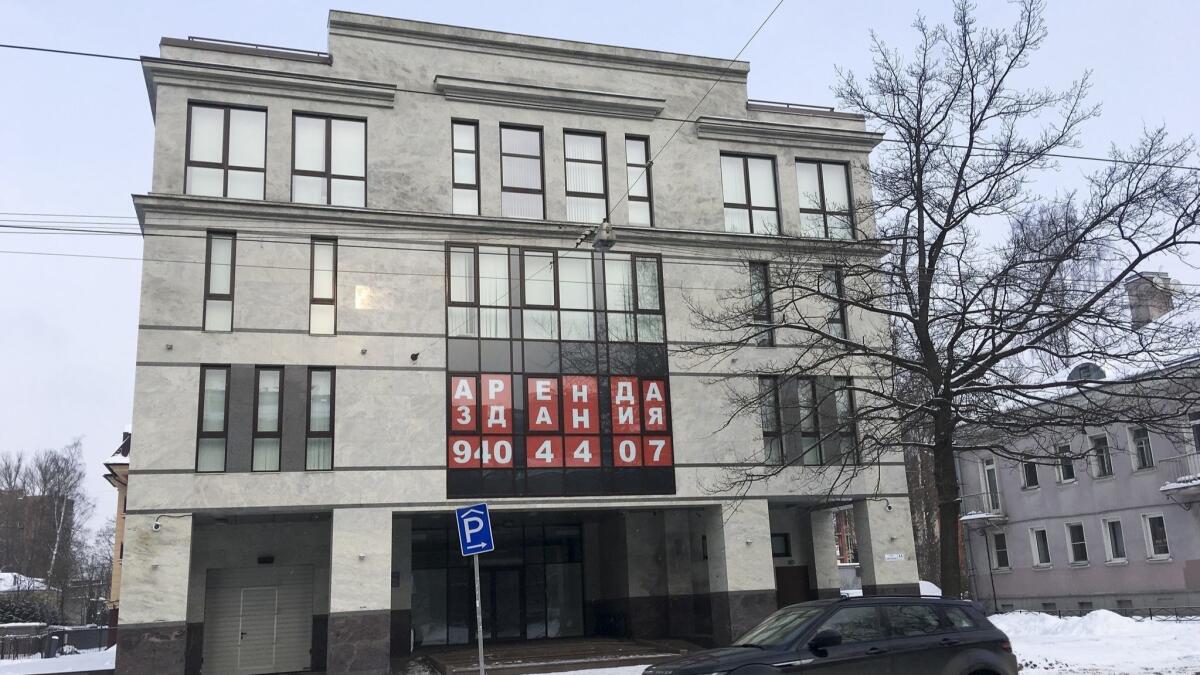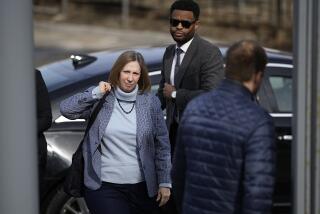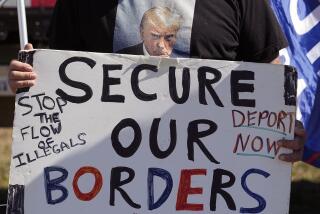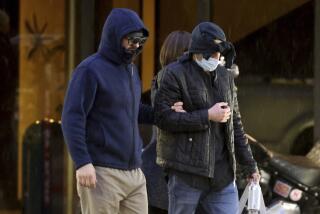Russian accountant charged with interfering in 2018 midterm campaign

The Justice Department on Friday unveiled the first foreign-meddling conspiracy case to arise from the 2018 midterm campaign, charging a Russian accountant with helping to spread election disinformation through fake social media accounts.
Elena Alekseevna Khusyaynova, 44, was allegedly the chief accountant for “Project Lakhta,” a disinformation effort spearheaded by the St. Petersburg-based Internet Research Agency, which was also accused of interfering in the 2016 presidential race.
U.S. officials described the agency as a “troll farm,” known for its prolific output of inflammatory and often false social media posts. The organization is funded by Yevgeniy Viktorovich, an oligarch with close ties to Russian President Vladimir Putin.
Spending on such online subterfuge has increased, according to a newly unsealed affidavit, as Moscow advances its effort to inflame political divisions in U.S. campaigns that will determine control of Congress.
Social media posts from accounts with names such as @TrumpWithUSA and @wokeluisa pretended to highlight debates over gun control, illegal immigration and protests by professional football players during the national anthem. But none of them were written by Americans, officials said, and all of them were intended to amplify controversial viewpoints.
Viktorovich was previously charged by special counsel Robert S. Mueller III, who is leading the investigation into Moscow’s meddling in 2016 and whether anyone from the 2016 Trump campaign conspired with Russians. However, the case against Khusyaynova is being handled by the Justice Department’s national security division.
“Americans disagree in good faith on all manner of issues, and we will protect their right to do so,” said Assistant Atty. Gen. John C. Demers in a statement. “Unlawful foreign interference with these debates debases their democratic integrity, and we will make every effort to disrupt it and hold those involved accountable.”
Khusyaynova has not been arrested and, as a Russian national living in St. Petersburg, is unlikely to be extradited to stand trial.
Follow the latest news of the Trump administration on Essential Washington »
The Russians developed detailed guidance on how to target social media posts. Liberals were believed to be more active at night, which was daytime in St. Petersburg. And workers were told that conservatives would see their posts “when they wake up in the morning if you post it before you leave in the evening.”
Some posts spread false information about former President Obama’s ties to the Muslim Brotherhood or claimed that every deported family of illegal immigrants would save the country $700,000. Social media campaigns were centered around articles from fringe U.S. websites such as WorldNetDaily, which published “The 8 Dirtiest Scandals of Robert Mueller No One is Talking About” in August 2017.
Russian workers were encouraged to share the article by describing the special counsel as a “highly politicized figure” and insisting “there will be no honest and open results from the investigation.”
At the same time, Russians also posted messages supportive of Mueller’s investigation.
“Still think this Russia thing is a hoax and a witch hunt? Because a lot of witches just got indicted,” one tweet said.
President Trump downplayed the new charge on Friday, saying the Russian effort “had nothing to do with my campaign.” Asked whether he had any warnings for Russia or other countries who try to meddle in U.S. politics, Trump said, “I’ve already said that.” He blamed Obama for not doing more about the problem in 2016.
The charge comes as the Trump administration is still grappling with foreign election meddling. The Homeland Security Department organized a briefing on Friday morning to detail how local, state and federal officials are prepared to handle misinformation surrounding the elections and attempts to hack the voting process.
John Bolton, President Trump’s national security advisor, announced he would visit Moscow this weekend to meet with the Russian foreign minister and other officials, and election issues are expected to be on the agenda.
In addition, top national security officials issued a rare joint statement saying they’re “tirelessly working to identify and counter threats.”
“We believe the greatest strength of our society is an engaged and informed public. Adversaries target U.S. elections to divide America along political lines and influence key policy decisions that are in their national interest,” said the statement released by the office of Dan Coats, the director of national intelligence.
U.S. officials have said Russian efforts do not appear to be on the same scale as two years ago. During the 2016 presidential race, Russian military intelligence officers hacked Democratic Party emails and distributed them online to embarrass Hillary Clinton’s campaign, according to an indictment obtained by Mueller this year. They also probed state election offices, although there’s no evidence of any tampering with votes.
Federal officials said Friday that they continued to believe that midterm election ballots would be safe.
“We’re not aware of any compromises,” said Christopher Krebs, a Homeland Security undersecretary.
However, the latest criminal case makes it clear that disinformation efforts have not ended.
“The conspiracy has a strategic goal, which continues to this day, to sow division and discord in the U.S. political system, including by creating social and political polarization, undermining faith in democratic institutions, and influencing U.S. elections, including the upcoming 2018 midterm election,” said the affidavit filed last month and unsealed on Friday.
The affidavit said Viktorovich’s companies — Concord Catering and Concord Management and Consulting LLC, both of which have already been charged in a previous indictment — used roughly 14 bank accounts to funnel money to Project Lakhta while claiming the payments involved software development and other business functions.
Khusyaynova kept detailed financial records, according to the affidavit, tracking spending on social media marketing, computer servers, salaries and office rent.
In 2016, Project Lakhta’s expenses were $12 million, or 720 million rubles, the affidavit said. Spending rose to $12.2 million in 2017, even though there weren’t national elections.
The budget appeared to continue expanding this year as well. More than $1.9 million was requested in June, the latest month included in the affidavit.
Social media networks have pledged to crack down on foreign influence campaigns, deleting fraudulent accounts and increasing transparency around their operations. But the affidavit said Russians continued to purchase advertisements on Facebook and Instagram in the first six months of this year, spending more than $66,000. Another $18,000 was allegedly budgeted for managing Twitter accounts.
Despite the ongoing efforts, the misinformation campaign has not reached the same scale as 2016 yet, according to U.S. officials.
“I’m kind of paranoid by disposition,” Krebs told reporters during Friday’s briefing. “When I’m not seeing a lot of activity, there gets me thinking, what are they doing, might they be waiting for the last minute?”
Twitter: @chrismegerian
UPDATES:
3:25 p.m.: The article was updated with comments from President Trump.
2:45 p.m.: The article was updated with more details about the case.
The article was originally published at 11:35 a.m.
More to Read
Get the L.A. Times Politics newsletter
Deeply reported insights into legislation, politics and policy from Sacramento, Washington and beyond. In your inbox three times per week.
You may occasionally receive promotional content from the Los Angeles Times.







